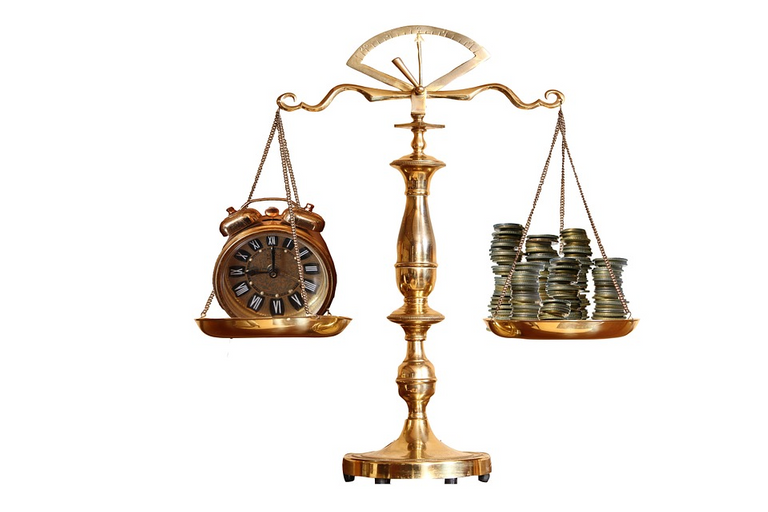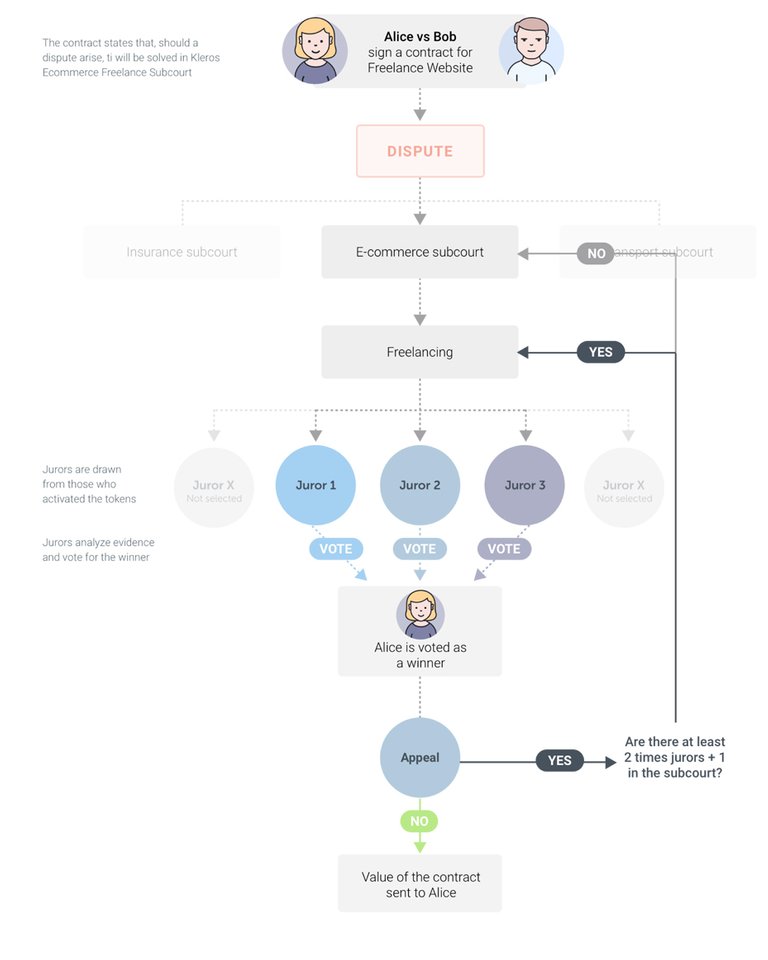A World Without Kleros:
To understand more about the online blockchain business industries that Kleros can help, first I will provide you with details on how a usual online e-commerce dispute resolution works.
Also I will share a possible issue arising from a contract freelance work/project.
◘ Sample E-Commerce Dispute Process ◘
In simple terms, an eBay dispute resolution can go like this:
- Delivered Item is missing a piece thus buyer contacts seller to replace or refund it.
- Seller refuses so buyer opens an eBay resolution case stating reason for opening case.
- Seller funds are put on hold.
- Seller responds saying item is complete.
- Buyer insists on refund or replacement.
- Seller ignores buyer for a few days.
- Buyer escalates case to eBay and provides pictures as proof.
- eBay solely arbitrates based on company policies, evidence and statements from both parties. Decides the case in favor of buyer, stating reason.
- Buyer receives refund.
- Seller appeals.
- Seller is declined, eBay provides explanation.
- Seller learns to package items well before shipping anything.
The same thing happens in PayPal disputes. This is almost the same process with freelancing websites. Freelance work sites like Upwork offer escrow services where they hold the money of the buyer/hiring person until they are happy with the service or final product (article, flyer design, etc.) they receive.

People who don't want to use these fee laden middlemen websites will see Kleros as the better option. They can also use a decentralized marketplace website that does not charge any fees, allows cryptocurrency use and has Kleros as its arbitration system. They can feel safe because it serves as their blockchain money back guarantee.
◘ Sample Freelancing and Contract Issue ◘
Let's say Giselle is hired to do a mural for ABC restaurant. Giselle comes up with a contract stipulating what each party will expect to happen. She states that she will accept 50% down payment before starting the project. The 50% balance needs to be paid once the mural is finished. If there is a late balance payment, she will be paid an additional fee. ABC restaurant agrees and both sign the contract.
Giselle finishes the wall art. ABC restaurant is happy but could not pay the balance on time. Since payment is delayed, she expects an additional fee added to the balance. ABC restaurant eventually pays her but without the late fee. Giselle follows up on it but is given an excuse time and again.

This will be a hassle to Giselle if she decides to take the dispute to court. She would have to pay expensive attorney fees and use plenty of time just to get the additional fee. Giselle resorts to just post her ordeal online to share her experience and warn others about ABC restaurant. She is now without the agreed on fee.
Isn't this such a sad and frustrating scenario? What if both parties had decided to use Ethereum (ETH) as payment method and a smart contract to release it? If they used Kleros, this situation wouldn't have been such a problem to Giselle.
The Kleros Solution
The words Kleros and Pinakion are from the Greeks. Both are part of the Athenian system of selecting public officials or members of juries. The two are appropriate terms we can use for a justice system in this cryptocurrency era.
Kleros is the answer to blockchain dispute problems. It is a computing layer that combines game theory with community sourcing and blockchain technology. Inspired by the Schelling Coin, Kleros is where people will always come to a common or popular choice upon with the help of incentives. Smart contracts can be made with adding Kleros in the code to make arbitrated contracts. It also makes use of Pinakion (PNK) tokens.
Arbitrated contracts are what will execute the dispute resolution online. Would be jurors should have activated tokens in certain subcontracts in order to be eligible to be a juror. Jurors will also be chosen based on the amount of pinakion (PNK) tokens someone has. PNK tokens need to be activated in the Kleros system in order for it to be drawn. The tokens drawn by the system will decide who will become part of the Kleros jury.
Take note: Two people will have to opt in to use Kleros. If one does not, he/she will automatically forfeit the decision to the one who opts in.
Opting in to Kleros means paying for the arbitration fees. One or both of the people involved will have to pay the fees. An actual contract must be uploaded or encrypted in the blockchain for security and privacy. The arbitrated contract must have three things specified: the number of jurors, contract category and the results to be voted on.
When a dispute is initiated by any of the two involved in the contract, both of them should submit proof or evidence. The evidence will have to be reviewed by the randomly picked jurors in order to decide who wins the dispute.

Once a secure and individual decision has been made it cannot be changed. Jurors will share their reasons for their decision. They will also receive compensation via the arbitration fees and PNK tokens.
Should anyone decide to appeal the decision, both parties must opt-in to pay for the arbitration fees. Once appealed, the original jurors will be without the initial Kleros fees they received as it will be redistributed to the new jurors. This time the appellant must pay more than the other.
Once a decision has been made and a dispute winner selected, the new jurors will be paid with the fees and PNK tokens. In the event there are those who did not vote for the majority decision, they will be "penalized." As you can see in the diagram below, the PNK tokens will be redistributed to those who voted in majority.

Due to each juror's anonymous identities there is a only a rare chance of bribery. Retaliation and intimidation will also be impossible. Kleros then proves itself to be the best dispute resolution solution on the blockchain available to us today.
Take note: Kleros is still under research and experimentation. As such processes and details can change and be updated in the future.
How Does Kleros Work?
In simple terms, here is how Kleros resolves disputes.

Where Can Kleros Be Used?
- Kleros can be applied in decentralized social networks like Steemit or Ono. This is best used to prevent spam or rude behavior on the blockchain.
- E-commerce websites can also use Kleros for resolving disputes in case for buyer and seller problems. This can include anything from gaming platforms to escrow services to freelancing websites, etc.
- For crowdfunding purposes, Kleros can be used together with the smart contracts of anyone who contributes something.
- People who don't use third party e-commerce websites can just make smart contracts and add Kleros. Example of uses would be real estate or insurance purchases.
- Aside from those mentioned, anyone is free to think of a way to use Kleros. Whichever situation requires a decentralized and anonymous jury for a sound decision can find Kleros as the faster, more efficient and money-saving solution.

Now are you interested?
The Live Kleros Experiment
Should you like to participate in the live usage of Kleros, head on over to Doges on Trial.. As seen on the site, "The Doge List is Kleros' majestic curated list experiment."
Here is a diagram of how it works.

Meet the Team
There are a number of ways to reach the team in case you'd like to use Kleros in any website or system. You can choose to contact them via email or thru their Telegram channel.
Here are the hardworking Kleros team members.


To join them, click here to apply.
Meet the Advisors

The Partners

More Information & Resources
kleros2018
Non-Kleros sourced images are from Pixabay.
This is an entry to the writing contest by @originalworks.
Sponsored Writing Contest!
This post has been submitted for the @OriginalWorks You can also follow @contestbot to be notified of future contests!
Congratulations @iwriteonline! You received a personal award!
You can view your badges on your Steem Board and compare to others on the Steem Ranking
Vote for @Steemitboard as a witness to get one more award and increased upvotes!